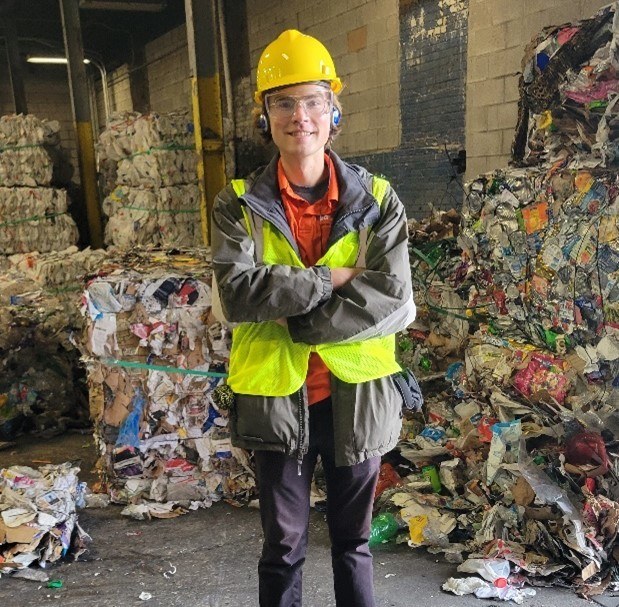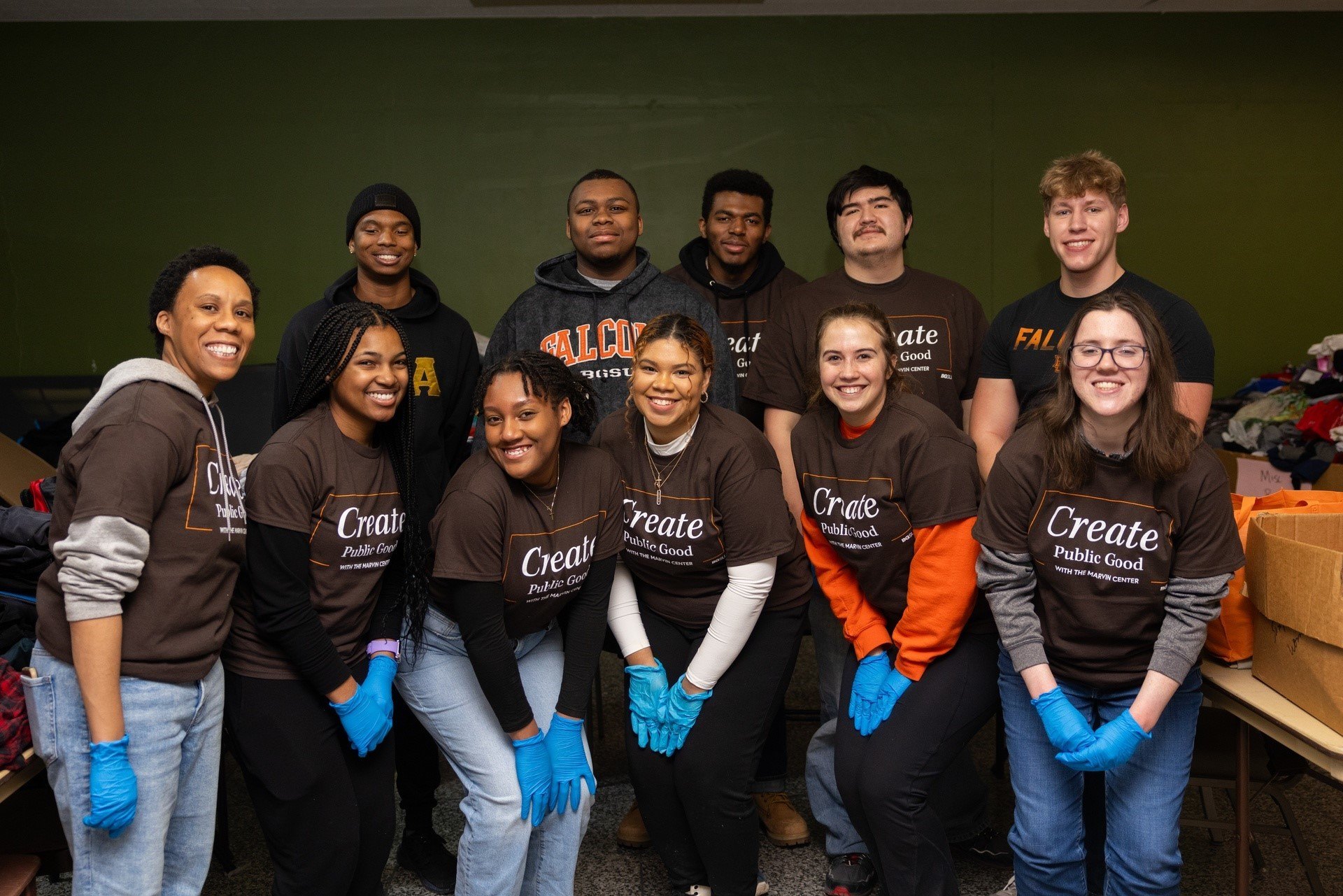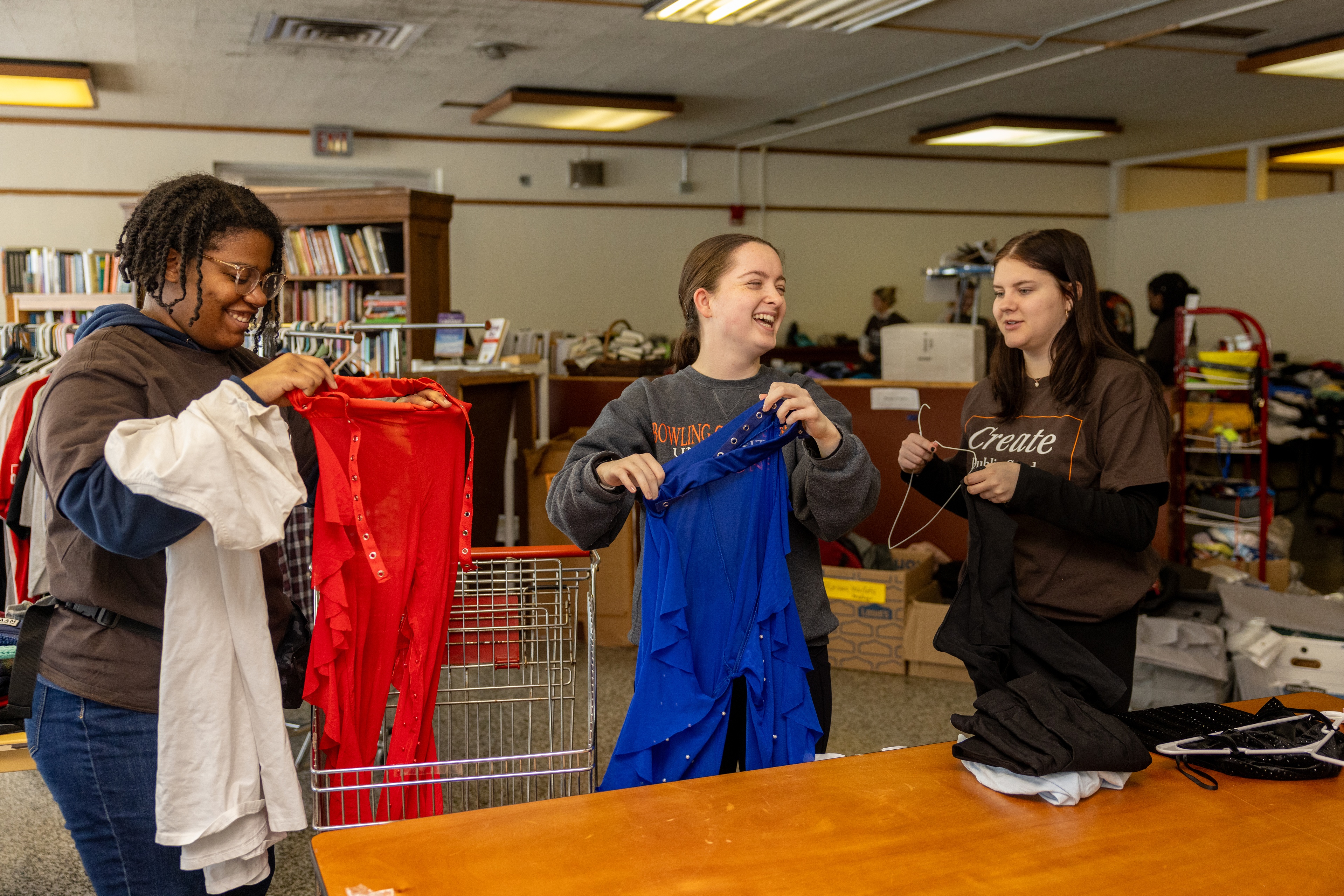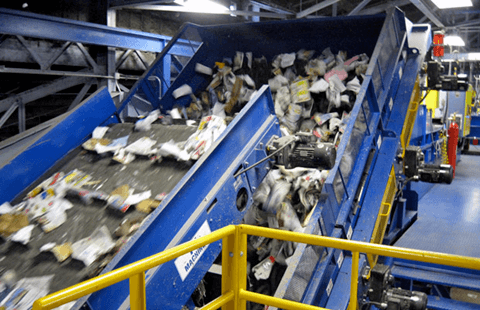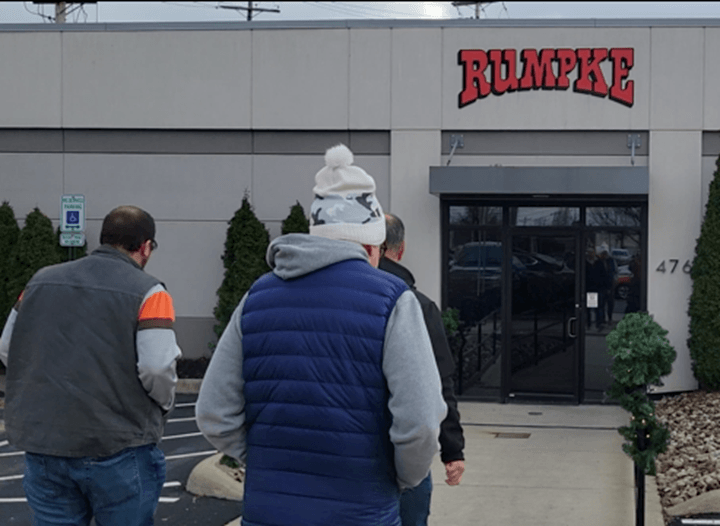Spring 2024 Newsletter
Eco-Hero Spotlight
By: Zach Nemec
The Eco-Hero Spotlight is an initiative started by Campus Sustainability to actively seek out and recognize individuals or groups that make an Eco-friendly impact on BGSU. Anyone can be an Eco-Hero, so long as they are willing to do what it takes to promote sustainability.
In this month's newsletter, our Eco-Hero is BGSU’s Zachary Hayes.
Zachary Hayes came to Bowling Green State University for his graduate degree in August 2022. Obtaining his Master’s in Geospatial Analysis this past fall semester, Zach is a former Office of Sustainability Intern, who contributed his sustainable knowledge for the office for 2022 and 2023. Growing up in the great white north, Michigan to be exact, Zach received his undergraduate from the University of Michigan-Flint with a degree in Science in Energy and Sustainable Systems. Wanting to pursue his education further, he ended up at BGSU and became a sustainability intern after meeting Dr. Nicholas Hennessy, BGSU’s Sustainability Manager.
As a Campus Sustainability Intern, Zach had a variety of projects and weekly duties that helped advance the cause of BGSU's goals to reduce waste and increase reuse principles and recycling, reduce energy, and carbon emissions, and engage BGSU students and staff through educational efforts and service opportunities. One of the first projects that he started when becoming an intern was collaborating with USG and GSS on creating the Green Falcon Pledge, which is a way for BGSU students, faculty, and alumni to commit to more daily environmentally sustainable practices. He’s been a part of expanding the composting program at BGSU, certified several offices through the Green Office program, conducting educational recycling tables in the Union, and orchestrated programming for yearly sustainable events, just to name a few.
Zach has always had an innate awareness for sustainability from an early age. From middle school to high school, and into college, he has always continued his involvement with sustainability because of his passion to leave the world better than when found. This stays true in his personal life as well. Zach does many little things to be as sustainable as possible, such as biking anywhere he can, taking short cold showers, recycling as much as possible for himself and other friends, never buying bottled water or seeking out new things that he doesn’t need, rarely buying new clothes and only getting thrifted items if he does, opting for items with less packaging including food when grocery shopping, sticking to a mainly plant-based diet, and carpooling as much as possible. He tries to be a minimalist when it comes to his consumer habits and tries to make very conscientious choices.
Looking back during his time with BGSU, Zach was impressed with the variety of programs that the Office of Campus Sustainability manages. He was happy to learn how much BGSU really cares about practicing sustainability endemically, even if each semester brings about new challenges. He really likes how there is a lot of collaboration between the Office of Campus Sustainability and students, staff, and departments, especially with the Student Green Initiatives Fund, as new sustainable ideas and innovations can come to life.
Zach would like to end on a positive note for current and future generations at BGSU. “Everything you do throughout your day has an impact on the environment, for better or for worse. Students have a powerful voice at BGSU to make change, so don't underestimate your role as a student.” He would also encourage students to volunteer whenever you can with different student organizations, because extracurricular service experiences can really help guide you to what you want to do once you graduate. “Be involved and try new things! BGSU is full of opportunity.”
Thank you, Zach, for your service in the Office of Campus Sustainability and for being a strong role model in lowering your carbon footprint and impact on the Earth for the entire university community.
Service With A Smile
By: Dr. Nick Hennessy, BGSU Sustainability Manager
Campus Sustainability is a small office. One fulltime staff member, and several student interns. Our mission of making BGSU a more sustainable institution, through emissions reduction, waste reduction, and education/outreach is accomplished not just by us, but by empowering the entire university campus to operate and act sustainably.
You might think that our ability to engage students in meaningful sustainability service projects would be limited. However, for the 2022-23 academic year, Campus Sustainability as an office provided not only the largest number of student service projects, but also engaged the greatest number of students in service. This is done through a variety of recurring and special projects, which include Friday Night Lights, the Re Store, tree planting projects, Green Game Day (during the fall football season), campus cleanups, When You Move Out, Don’t Throw It Out (WYMO), special recycling projects, and much more. Campus Sustainability utilizes the BGSU Serves platform, administered by the Marvin Center for Leadership, which has been a game changer in terms of keeping track of service hours and volunteer registration, among other metrics.
To find out what Campus Sustainability projects are available for registration at any particular time, simply connect with the BGSUServes platform (everyone, including students, faculty and staff can register with BGSUServes) which is off the Marvin Center website https://bgsu.givepulse.com/ and search for “Campus Sustainability”. Additionally, we coordinate projects for individual groups as well, depending on the type of project desired, our needs, and the availability of our staff for supervision. Volunteers are always welcome and if you’d like to get on our standing volunteer list so that you get notifications of our need for volunteers as they come up, you can complete the volunteer form off our website, at https://www.bgsu.edu/campus-sustainability/volunteer.html
Most recently, Campus Sustainability served as an on-campus project site for volunteers for the Martin Luther King Jr. Day of Service on January 15. Twenty -five students, including a large contingent from the AIMS Program, came to the Re Store, a reuse concept operated by Campus Sustainability and located in the McDonald Hall Annex. They assisted with sorting various donations and surplus items of clothing and bedding, as well as “stocking” the store shelves and preparing us for our January 24 open event. Given the small size of the Campus Sustainability staff, this help was extremely valuable, as is any help provided by any volunteer at any time. Feedback from our projects shows us that students do in fact learn some things about sustainability: how to reduce waste; how to buy less and reuse more; how to recycle correctly; how trees help the environment; what BGSU recycles and what BGSU is doing to be more sustainable, among other things.
We hope to see you at one of our projects soon!
Our Columbus Field Trip to Rumpke Recycling
By: Zach Hayes
On Wednesday, December 6th, four BGSU representatives set out on a mission to discover what happens to BGSU’s comingled recycling once it gets picked up by Rumpke’s recycling trucks. The team included Eric Heilmeier, Director of Campus Services; Andrew Angelone, Procurement Specialist; Dr. Nick Hennessy, Sustainability Manager; and Zachary Hayes, Graduate Sustainability Intern. We traveled to the heart of Columbus where the District Office and Material Recovery Facility (MRF) for Rumpke is located.
BGSU’s recycling is taken directly to the “Tipping Floor” for processing where the sorting process begins. After all, not everything that ends up in our orange recycling dumpsters can be recycled, as much as we try. Heavy equipment operators move the materials onto the first conveyor belt which takes the material up to the separating apparatus. Everything from our campus is mixed and comingled and ultimately needs sorting into individual commodities which are sold to a variety of buyers. Think about all of our orange dumpsters full of plastic, aluminum cans, cardboard and paper – that all has to be separated and sorted through a combination of technology and human personnel. Spinning discs sort light, bulky materials such as cardboard from smaller items such as papers, steel cans, and plastics. These smaller items then go to an angled sorter that uses gravity and the angles of the small discs to sort out three dimensional items from flat ones.
To separate cans by their types of metals, there is a magnet that will attract the magnetized steel cans, and another magnet that uses electrodynamic properties to repel aluminum cans so that they end up on a different conveyor belt. There are a lot of advanced technologies that go into Material Recovery Facilities. I was particularly impressed by the optical scanner technology that utilized infrared light and a computer to detect the type of specified material, which was #2 plastics. Within milliseconds, the machine would send a targeted blast of air at the object and propel it to a separate conveyor belt.
While all the technology and robotics that are incorporated into the recycling process are impressive, they still aren’t 100% efficient at removing contamination. A number of workers are employed to sift through conveyor belts of items as they approach the final baling area. It seems that there is still a decent amount of contamination that the line workers must sort through, despite the technology used upstream. So, what are the biggest contaminants that we saw at Rumpke and that everyone at BGSU can help us prevent?
#1 – Plastic Bags. Plastic bags are notorious for wrapping around spinning components and getting tangled in machinery. You might not realize that plastic bags can wreck machinery because in certain conditions, they can elongate up to 500% of their original length, and these thin strips of plastic get stronger as they combine, choking spinning equipment. You can help by not bagging your recyclables – please dump them into our orange containers. NO plastic bag of any kind should ever be placed in a BGSU commingle recycling bin or container. Clean plastic bags can be independently recycled in the BTSU and Falcon Heights lobbies, or at many local grocery store entry lobbies. These containers are for plastic bags ONLY.
#2 – Lithium Ion Batteries. A common contaminant that some will try to recycle is e-waste. Anything with a rechargeable battery such as cell phones, laptops, portable chargers, and more can cause destruction of equipment and are a fire hazard. Anytime that a lithium-ion battery is punctured, volatile electrolytes can easily contact each other, causing a chain reaction called “thermal runaway” that is as bad as it sounds because it will lead to a chemical fire. You can help by dropping off your e-waste at designated locations, found by scrolling down our website: Electronic Waste Recycling (bgsu.edu), or by submitting a pickup request for larger items.
#3 – Lids. Specifically, lids on cups and glass jars. There is an easy way to tell if the lid can be recycled with the container. If the materials of the tops and bottoms match, then it is good to leave the lid on. If the tops and bottoms DON’T MATCH, then DISCARD the lid before recycling the container. Examples of this include cleaned food glass jars where the lids are metal and paper coffee cups where the lids are plastic. Neither lid matches the material of the bottom, but the bottoms are recyclable with the lids removed.
#4 – Styrofoam. Another big no-no is Styrofoam. Oftentimes Styrofoam products are misleading because they may feature a recycling symbol. Styrofoam, while a form of plastic (polystyrene) is almost never recyclable anywhere. It is another main form of contamination that ends up in our recycling bins. It is oftentimes in the form of a to-go box for food orders, foam cups, or in packaging from shipping materials. Solo cups (red and all other colors) are a form of compressed Styrofoam and not recyclable. The more illicit things like Styrofoam that end up in our containers, the more that Rumpke has to send to the landfill, which is a lose-lose for both them and BGSU.
Rumpke works with a variety of front-end producers who take the baled materials and make new products out of them. These big blocky bales of sorted materials are pretty hefty – they can weigh 800 lbs. for aluminum cans and up to 2,000 lbs. for cardboard. These bales get taken to a variety of manufacturing groups that turn them into new products, either of the same thing or something different. Upon researching Rumpke’s buyers, all of them are very intense about sustainability and passioniate about doing the right thing for people and the planet, not just their profit. Below is a list of what materials are turned into by Rumpke’s buyers:
In summary, the trip to Rumpke was an eye-opening experience that showed us how BGSU’s recycling is processed in a way that provides materials for new products. It was incredible to see the volume of recyclables that were coming and going from the MRF. Rumpke stated that BGSU is a great partner because we are serious about limiting contamination. You can do your part by making sure you know what to recycle on campus; obeying the signage and educating others on how to recycle right!
What The Office of Sustainability Can Do For You!
By: Zach Nemec
The Office of Campus Sustainability operates within Bowling Green State University’s Campus Operations and has been since 2010. Here, numerous sustainability initiatives, projects, and practices are administrated, such as recycling, composting, and of course, reducing our carbon footprint. However, you may not know is how our office can benefit your own department or area? This article will explain some of the services that the Office of Campus Sustainability can perform, and how your collaboration can help make BGSU more sustainable.
ReStore
Does your office or department have any donations of extra office supplies, unwanted small items, or surplus that you do not need anymore? You can donate it to the Campus ReStore! All donations of any kind are appreciated by students and staff alike who will reuse these items. The Office of Sustainability will come and pick up these items directly from your office. Submit an online maintenance request (Found on the lefthand miscellaneous service menu of myBGSU). In the body of the request, state that you have items to donate to the Campus Sustainability ReStore. These items that are taken to the ReStore are featured at numerous events each semester, allowing students, faculty, and staff to take and reuse them.
Electronic Recycling
Extra office supplies and surplus are not the only items that the Office of Campus Sustainability will pick up for you. Electronic waste is a large contributor towards the overall waste diversion on campus, and is efficiently picked up by AIM Ecycling, the university’s R2 Certified Electronics Recycler. We’ll pick up computers, cords, phones, tablets, ink, and toner cartridges, virtually anything with a cord, and batteries. According to the World Health Organization, an estimated 53.6 million tons of e-waste were produced in 2019, but only 17.4% of that was recycled. E-waste is the fastest growing solid waste stream in the world according to WHO, so it is important as ever to recycling your outdated or broken electronics whenever you can, and conveniently, our office will do that for you. Similar for donations to the ReStore, submit a maintenance request, reference our office, and we will pick up those items or you. If your office would like to host an electronic recycling box, we will give you one upon request! For more information, go to bgsu.edu/campus-sustainability/recycling-waste-reduction/battery-inkjet-cartridge-recycling on our sustainability webpage.
Green Office Certification
The Office of Sustainability encourages offices to apply for Green Office Certification (GOC)! GOC attempts to decrease the environmental footprint of campus by encouraging departments and offices to engage in daily, environmentally sustainable actions within their office. A checklist can be found on the website that highlights each sustainable task an office could be doing to operate more sustainably. Once an office evaluates themselves, the Office of Sustainability will meet and discuss about their overall score and perform a quick office audit. If an office receives a sustainability score greater than 80%, they receive certification, along with a framed certificate and a feature on our webpage.
Recycling
If your office is doing a cleanout, going through old files, books, etc., you can obtain additional recycling bins as well as advice and instructions on what can and cannot be recycled, and well as suggestions and pointers. Simply email us at greenbg@bgsu.edu and explain your project and we’ll help you set up.
These are just a few ways Campus Sustainability can assist your office in being more sustainable. However, we welcome your questions or comments at any time, and we are always available to talk. Contact us at greenbg@bgsu.edu or call us at (419) 372-9949.
Sustainability Questions & Suggestions
Do you have any questions, comments, concerns, or suggestions related to sustainability? If so, feel free to contact us at greenbg@bgsu.edu. Alternatively, you can reach us on Facebook, Twitter, or Instagram @GreenBGSU.
We look forward to hearing from you!
Like staying up to date on all of BGSU's sustainability updates? Be sure to subscribe to our newsletter to get it sent to your email inbox each month!
Updated: 02/02/2024 03:15PM

